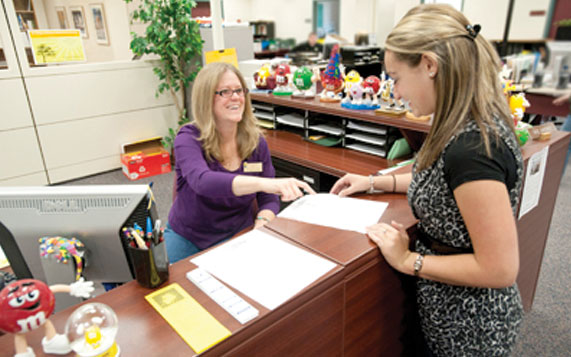High-Stakes Standardized Testing: A View from the Elementary School Office
by Jenny Russell, Reynoldsburg Support Staff Association
 It starts at the very beginning of the day. At arrival, some kids trudge in, others are jittery and anxious. All students start the day in the gymnasium for the school’s daily morning assembly. As the school secretary, I stay in the office, but I can hear the teachers and staff give a pep talk – “You’re going to do great! You’re going to rock the test!”
It starts at the very beginning of the day. At arrival, some kids trudge in, others are jittery and anxious. All students start the day in the gymnasium for the school’s daily morning assembly. As the school secretary, I stay in the office, but I can hear the teachers and staff give a pep talk – “You’re going to do great! You’re going to rock the test!”
But even before the test begins in the morning, I see students in the clinic. “I threw up in the bathroom.” “My stomach hurts.” When I’m wearing my nurse hat, I usually ask, “When did this start?” “When I woke up.” “Did you tell an adult at home? What did they say?” “They said the test is important and I have to go to school.” Lots of parents feel it, too.
Today’s test, or section of a test (most tests have multiple sections and are given over multiple days), starts and ends at a specific time. But in the office, I don’t know if one class starts ten minutes late because they’ve decided to give kids one more chance to use the bathroom, or because they’re waiting for Sally, who is a half-hour tardy almost every day, to show up at school. This means I don’t know exactly when the test ends.
For a half hour, an hour and fifteen minutes, or two and a half hours, there needs to be silence. Often the principal and school psychologist are both administering tests and cannot be disturbed. I send out an e-mail plea for teachers to keep students in their classrooms and not send them down to the office for behavior problems. This is also important because the other rooms in the office suite are also being used for testing – students who receive special accommodations test in these spaces, so the office needs to be quiet during the test, too.
 If students arrive at school late, after the test begins (and we almost always get at least one late arrival), they need to stay in the office until the test is finished. Usually they have a book and can keep themselves occupied. Sometimes a parent angrily demands, “Why does she have to sit in the office?” (despite paper schedules, e-mail messages, and even automated phone calls to families the night before, pleading with them to help their children get a good night’s sleep and arrive at school on time because today is a testing day). Occasionally a parent will take their child with them and leave in a huff. But usually, the student(s) and I wait for the all-clear, to let us know that testing is over and they can rejoin their classes.
If students arrive at school late, after the test begins (and we almost always get at least one late arrival), they need to stay in the office until the test is finished. Usually they have a book and can keep themselves occupied. Sometimes a parent angrily demands, “Why does she have to sit in the office?” (despite paper schedules, e-mail messages, and even automated phone calls to families the night before, pleading with them to help their children get a good night’s sleep and arrive at school on time because today is a testing day). Occasionally a parent will take their child with them and leave in a huff. But usually, the student(s) and I wait for the all-clear, to let us know that testing is over and they can rejoin their classes.
After the test is over, I get more clinic visits. Sometimes the kids know they’re truly sick and have just come to school to take the test. This always makes me a little proud and a little sad. Sometimes they tell me that their head started hurting or their stomach started twisting just before or during the test. Sometimes they are not really feeling bad, they’re just looking for a little extra TLC on a stressful day. These usually aren’t my “frequent flyers,” students who I see in the clinic a lot. They’re just regular kids who are stressed out by standardized test after standardized test.
Kids also talk to me about the tests. Luckily, at the elementary level I haven’t gotten any deep questions about why they have to take the tests, although I know they touch on this in their classrooms. They tell me things like, “I’m scared. What if I fail the [OAA reading] test and can’t go to 4th grade?” Or “I’m sick of taking tests.”
They don’t know that these are high-stakes tests. They don’t realize that if many of them do poorly on one or more of the tests, in our district at least, their teachers may be offered probationary contracts instead of standard contracts. They don’t understand that low performance on these tests may lead to a reduction in funding for the entire school.
And I’m glad. Because the ways things stand today, these tests make our students anxious enough.
A Little Something for the School Secretary
by Jenny Russell, Reynoldsburg Support Staff Association
 School secretaries rarely encounter students at their best. Students come to the office when they’re tardy, sick, injured, misbehaving, and in trouble. They ask the secretary for help when they leave their homework in Mom’s car or lose their house key. They dash through the office door when their medication has worn off and it’s time for their next dose. They are often embarrassed, uncomfortable, distressed, angry, or upset when they’re in the office.
School secretaries rarely encounter students at their best. Students come to the office when they’re tardy, sick, injured, misbehaving, and in trouble. They ask the secretary for help when they leave their homework in Mom’s car or lose their house key. They dash through the office door when their medication has worn off and it’s time for their next dose. They are often embarrassed, uncomfortable, distressed, angry, or upset when they’re in the office.
Secretaries don’t get to know students in the classroom. We don’t see them do great on a test, work hard to improve their reading skills and succeed, play with their friends at recess, and laugh with their tablemates at lunch. It can be tough for us to picture students outside the office; we don’t see “the whole child.”
 This week is Administrative Professionals’ Week — Administrative Professionals’ Day is Wednesday, April 22. This “holiday” started out as Secretaries’ Day in 1952. In the 21st century it’s observed in many workplaces by bosses and co-workers giving cards, flowers, and candy to receptionists, executive assistants, and secretaries. This year, I’d like you to think about a different kind of gift you can give to your school’s secretary.
This week is Administrative Professionals’ Week — Administrative Professionals’ Day is Wednesday, April 22. This “holiday” started out as Secretaries’ Day in 1952. In the 21st century it’s observed in many workplaces by bosses and co-workers giving cards, flowers, and candy to receptionists, executive assistants, and secretaries. This year, I’d like you to think about a different kind of gift you can give to your school’s secretary.
People become school secretaries because they like children and believe in the power of education. But sometimes, working in the office, seeing students as we do, school secretaries’ jobs can be grueling. We need to hear the good news, especially about our “frequent flyers” (kids who come to the clinic or get in trouble a lot). Was Cindy selected to share a poem she wrote with the entire school? Did Jorge welcome a new student to class and show him the ropes without being asked? Was Fatima the top candy-bar seller during the school fundraiser? Did Michael test out of English-language learner services? Did Akira get the best math score in the entire second grade? Did Sam get really angry at someone and choose to go cool off outside the classroom instead of calling names or hitting another student?
 Consider your school’s secretary for a moment. What accomplishments are your students making that the secretary might like to hear about (preferably in the presence of the student)? Occasionally students will themselves tell office staff about an achievement that made them proud … but not often enough. Maybe you think that’s something the school secretary doesn’t pay attention to. Think again! Which students in your class does she (or he) see most often? Make sure you mention it to the secretary when those students make good choices, improve their scores, or show leadership. We really want to know!
Consider your school’s secretary for a moment. What accomplishments are your students making that the secretary might like to hear about (preferably in the presence of the student)? Occasionally students will themselves tell office staff about an achievement that made them proud … but not often enough. Maybe you think that’s something the school secretary doesn’t pay attention to. Think again! Which students in your class does she (or he) see most often? Make sure you mention it to the secretary when those students make good choices, improve their scores, or show leadership. We really want to know!
What to do about too much testing — Fight, Flee, or Fake It?
 By Julie Rine, Minerva Local Education Association
By Julie Rine, Minerva Local Education Association
For almost twenty years, I have prepared students in my classes for the Proficiency Test, the OGT, the ACT, and now the PARCC and my own SLOs. Never before this year have I felt that the testing took over my classroom.
Add up the amount of time spent taking the tests, throw in the time spent taking practice tests, and the amount is already eleven class periods, and we haven’t taken the EOY PARCC yet. Toss in the periods we trekked down to the computer lab and the time we spent trying to log in to practice tests and get the technology to work right, and that adds another three wasted days.
And let’s not forget that while I was administering the PARCC to my freshmen, my other classes of juniors had a sub. But the juniors got the joy of taking two pre-assessment and two post-assessment SLOs, which took a total of four periods, so they got to bask in the excitement of testing, too.
And sometimes, just for old times’ sake, I will give my students a test to assess their understanding of a unit over say, Romeo and Juliet or transcendentalism.
The testing is ridiculous. Every teacher knows it, and now with the many issues with the PARCC and AIR tests, parents, too, are realizing that required testing has gotten out of control.
As a teacher, it seems to me we have a few options about how to approach these tests. Some teachers have taken a stand and left the profession, choosing to “flee”, protesting the craziness that education in America has become and refusing to work in a system that subjects our children to the whims of politicians, most of whom have no teaching experience of their own.
Part of me wishes I could do this, but I, like many others in the profession, have invested too much time and money to leave now. And truly, I do still like the kids and the content, but if that ever changed, I would have to seriously consider a Plan B.
Some teachers have chosen to “fight” back, by writing letters to legislators, participating in Lobby Days, and talking to anyone who will listen about how the “game” has changed with the requirement of all the tests, and of course, education should never be considered any kind of a game.
And, some choose to “fake” it, to tell their students that these tests are good for them, that they will help us know what to teach better, that we will get all kinds of really meaningful data that will help improve our teaching. They choose to smile and make the best of the situation and try to hide the fact that this is not what they signed up for when they decided to go into teaching.
I can’t fault anyone for taking any of these approaches. We all deal with adversity in life in different ways. Frankly, at this point we all have to choose whatever path works to keep our sanity. Teaching high school students, and being a generally outspoken and passionate advocate for issues I believe strongly in, I am choosing to fight.
I’m also choosing not to fake it with my kids. I have been brutally honest with my students, telling them exactly how I feel about the barrage of tests now required, and why I think they are unnecessary and take too much time away from actually engaging with each other in discussions about literature and writing and current events … you know, from actually LEARNING.
But, I have also told them that we must jump through this hoop. And we must do our best on the tests, on my part preparing them for the tests, and on their part taking them seriously and persevering even when they seem too hard or too frustrating or too pointless. Because in life and certainly in any job, there are times when you have to do things you don’t want to do.
If you’re lucky, when you encounter those unpleasant tasks, you might find yourself with a little bit of power to advocate for a change. And when the requirements come from politicians, we do have the right to voice our opinions. Part of being an educated person is knowing how to fight back in responsible and respectful ways, such as writing letters to or calling legislators, educating others on Facebook about the issues, and lobbying at the capitol.
Frankly, I don’t care what my students get on the PARCC if they leave my class understanding these much more important life skills. So I don’t fake it with my students and disguise my dissatisfaction with my happy teacher face, and I don’t flee the profession. Instead, I am trying to turn even this, perhaps the greatest obstacle to true teaching I have encountered in nearly twenty years, into a lesson.
That’s the kind of education that cannot be measured by a standardized test.
April 2015 Ohio Schools
- IN THIS ISSUE
- Recipe for Success – Through advocacy and commitment to change, Maple Heights’ cafeteria workers join local union
- OEA Members reflect on the Minority Leadership Training Program
- President’s Message: Our shared sense of purpose
Moved recently? Contact the OEA Member Hotline to update the address on file at 1-844-OEA-Info (1-844-632-4636) or email, membership@ohea.org. Representatives are available Monday-Friday, from 8:30 a.m. to 6 p.m. | OhioSchools — Past Issues
![]()
![]() Oh Yes, We’re Social — Join the Conversation!
Oh Yes, We’re Social — Join the Conversation!
![]()



